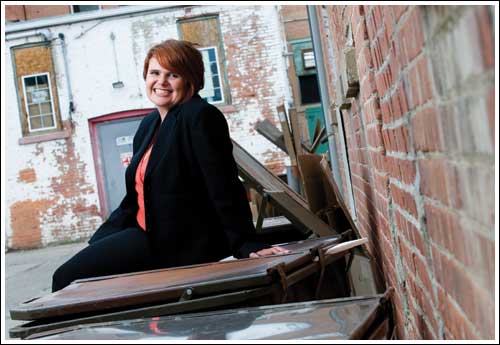There have been many nights over the last 16 years that Dr. Mary Runté has gotten little, if any, sleep. Raising two children has been no small factor in the equation, but even before Runté took on motherhood – the role by which she admittedly defines her life and holds most dear – she sacrificed shut-eye while out on the streets of east Vancouver, up at all hours of the night to do what she could to ease the plight of drug addicts, pregnant prostitutes and anyone else she encountered who was living their lives on the fringe of society.
It's not exactly the professional history you might expect a professor of management to have, but then again, Runté isn't your average management professor. Prior to 1998, Runté had no inclination at all to study anything remotely related to business. Her heart was then, as it is now, in the not-for-profit sector – although she also came to love management in a rather roundabout way.
Initially, Runté wanted to be a teacher, and was enrolled in the Bachelor of Education program at the University of Alberta en route to that goal. It was during that course of study that Runté discovered the impact she wanted to have on students went beyond teaching them the finer points of Shakespeare.
"You know how there are people who are into extreme sports? I'm into extreme jobs," Runté says with laughter. "I wanted to work in the inner city, so I was teaching kids who were dealing with huge life issues – drugs, gangs, various kinds of abuse. I quickly realized that I wanted to make a different kind of impact on their lives. That's when I went into social services."
Runté abandoned the BEd and instead pursued a BA in psychology, all the while working in the non-profit sector. After graduating, she spent more than a decade willingly subjecting her professional self to some of the grittiest and most challenging circumstances imaginable, and moved up the ranks of social work with expediency. While she loved the work, Runté found that she lacked many of the basic management skills necessary to run the programs. Suddenly, and unexpectedly, earning an MBA became a logical move.
"A lot of people were absolutely shocked and even viewed me as a traitor," Runté says reflectively. "In the non-profit sector, management is seen as the big bad world of business. Debunking the myth that all business is bad was, and still is, very important to me."

Determined to remain true to her non-profit roots, Runté chose York University for her MBA because, at the time, it was one of the only business schools in Canada that researched non-profit organizations.
"It was extraordinarily positive for me to interact with faculty who understood that business has power, and that the power can and should be used carefully," says Runté. "It's possible to prioritize people over dollars, the environment over profitability – or at least find a respectful blend of both sides."
Runté graduated from York in 2000 and began teaching sessional classes at the U of L that year. She completed a PhD through Saint Mary's University in 2005. Today, on track to become a tenured faculty member, Runté feels fortunate to be able to combine both of her professional disciplines, teaching business courses within the area of social responsibility – a declared minor that the Faculty of Management has now offered for a few years.
"It's core in the Faculty's vision to promote social responsibility in business. Every student takes a required course in it. In recent years, social responsibility has become more fashionable in business schools, but the U of L was one of the first universities to make a demonstrated commitment by offering a minor in the subject," says Runté. "I'm absolutely blessed to be teaching here."
A segment of the required course Runté teaches in social responsibility in business deals with non-profit management. Students must complete a minimum of nine hours of volunteer work and are free to choose any non-profit organization they wish to support. Runté says that it's very common for students to become impassioned with volunteerism and continue to be active within the organizations indefinitely.
"They intend to do nine hours of volunteering, and at the end, they're treating it almost like a part-time job," says Runté.
While Runté continues to champion the non-profit sector, emphatically pointing out that it's a significant employer within the country (constituting 13 per cent of the labour force) and contributes a surprisingly large percentage of the gross domestic product (seven per cent in 2003), she is quick to balance her view.
"Business isn't evil. It's important to our society. It has power, and that power gives us resources to do great things. It can help shape a more positive world. That's what I teach my students."
